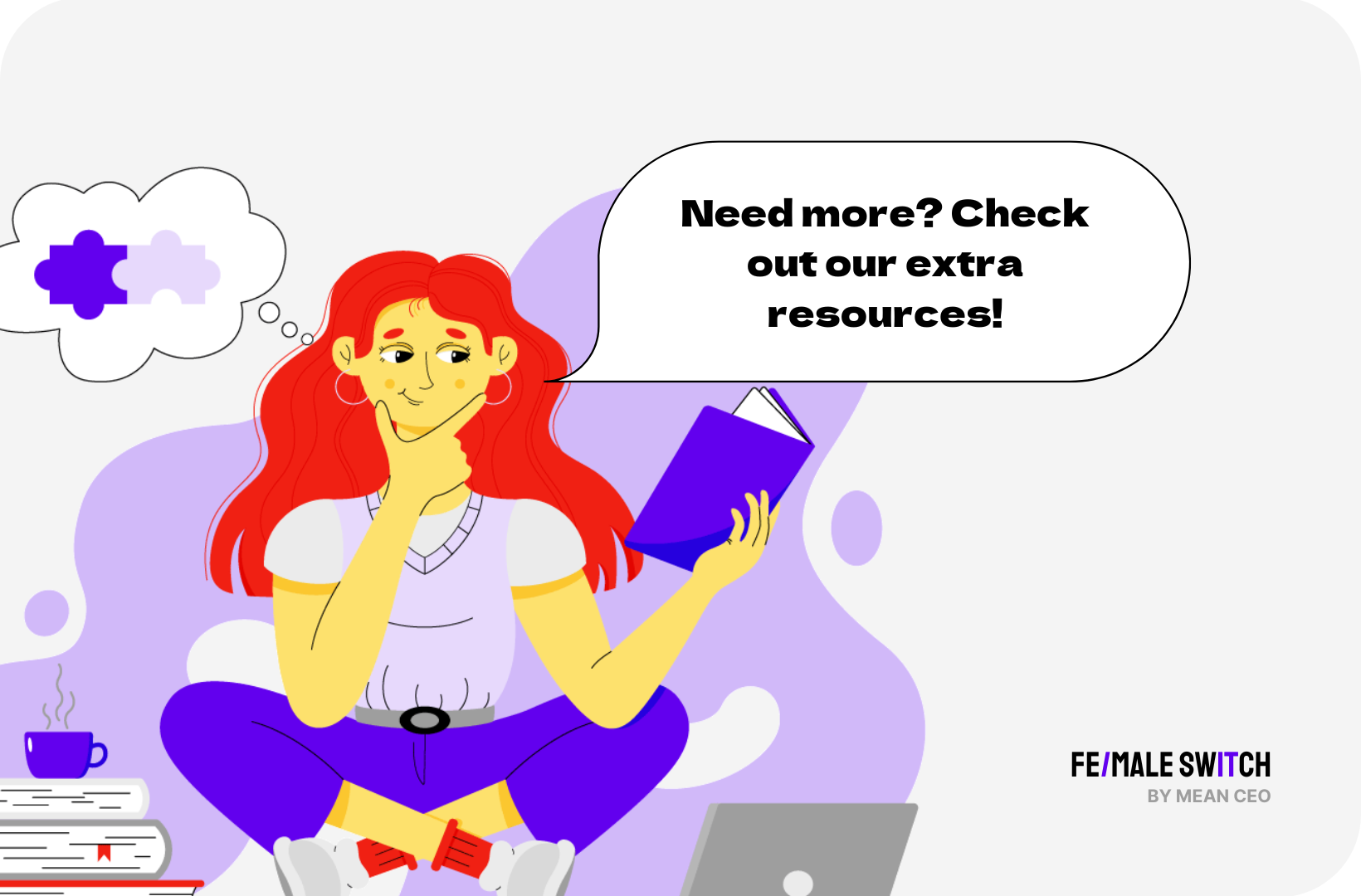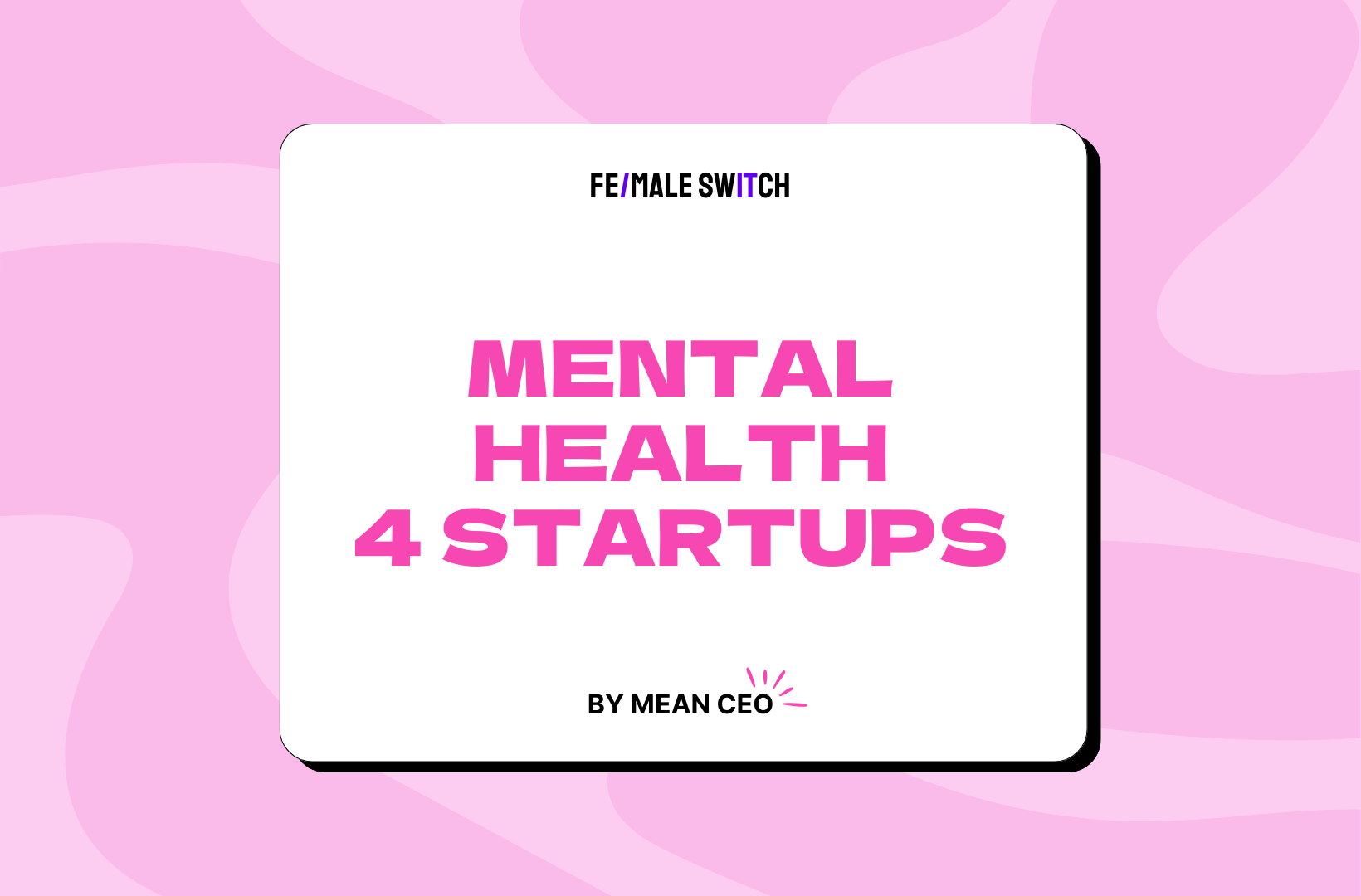TL;DR
Join us as we dive into the mind of Olga Weih, a career-shifter turned coach who has been helping female entrepreneurs unlock their potential from the Netherlands for the past decade. Olga breaks down the crucial role of mindset in entrepreneurial success, emphasizing overcoming limiting beliefs like "I can't be an entrepreneur." She reveals the nuts and bolts of coaching, steering away from traditional psychotherapy to focus on actionable goals within a tight 3-month framework.
Women in entrepreneurship often face a slew of challenges, from dealing with 24/7 work stress to balancing work-life dynamics. Olga's own battle with burnout underscores the importance of stress management and tailored coaching techniques. Plus, we delve into why women tend to prefer female coaches and how the stigma around mental health and coaching is slowly evaporating—thanks in part to pandemic-prompted awareness. Get ready to explore more with Fe/male Switch's crucial insights and watch the full video below!
Video Summary
Join Olga Weih and Violetta from Fe/male Switch as we dive into the world of coaching for female entrepreneurs. Olga, a coach and counselor, illuminates how coaching can help women achieve their business goals. Let's break down her insights.
About Olga Weih
Meet Olga Weih: half-Dutch, half-Russian, living in the Netherlands for 10 years, and a career-shifter from logistics to coaching. As a certified coach and counselor, she aims to help individuals become their best selves, overcoming limiting beliefs to unlock their potential.
The Entrepreneurial Mindset and Coaching
Olga emphasizes the importance of mindset in entrepreneurship. She explains that our thoughts can either propel us towards success or hold us back. For instance, beliefs like "I can't be an entrepreneur" can be dismantled through coaching and self-reflection.
Coaching doesn’t just dwell on the past like traditional psychotherapy. Instead, it focuses on actionable steps to move from point A to point B in a relatively short timeframe, usually around three months.
Challenges Women Face in Entrepreneurship
Women entrepreneurs often seek freedom, success, and financial independence but face numerous challenges:
- Uncertainty on how to start
- 24/7 work stress
- Pressure to find customers and balance work-life
Olga shares her personal experience with burnout, emphasizing the significance of stress management. Chronic stress can lead to severe burnout, and she helps clients prevent this through timely interventions.
Tools and Techniques in Coaching
Coaching employs techniques from cognitive and positive psychology, and transactional analysis, among others. It’s about finding the tools and strategies that uniquely fit each individual. Coaches facilitate growth by offering tools, a mirror to reflect, and a lantern to light the path forward.
Who Needs a Coach?
Olga points out that coaching is for those who are result-oriented, ready to take responsibility, and willing to take action. These individuals must believe in the possibility and be prepared to work towards their goals.
Coaching Women: The Gender Debate
Interestingly, Olga notes that women often prefer female coaches, although she stresses not to discriminate based on gender. What matters is comfort and connection. Men often seek her out for counseling rather than coaching, reflecting a possible overconfidence in solving their own issues.
Breaking the Stigma Around Mental Health
The conversation highlights a shift in attention towards mental health, spurred perhaps by the pandemic. Mental health has always been an issue, but only recently has it become less taboo. Violetta shares her own experience with coaching, primarily for business burnout prevention, stressing that employing a coach is a proactive step, not a sign of failure.
Olga emphasizes the common misconceptions surrounding coaching and mental health. Coaching is about prevention and empowerment, not just fixing what's broken.

Navigating Mental Health Challenges in Entrepreneurship
Understanding the Mental Health Landscape for Entrepreneurs
Entrepreneurs are especially susceptible to mental health issues, facing unique stressors that can impact their well-being. A staggering 72% of startup founders report grappling with mental health problems, including high levels of stress, anxiety, burnout, depression, and even panic attacks (72% of Entrepreneurs Suffer from Mental Health Issues). This statistic isn't just a number; it's a wake-up call highlighting the intense pressures of entrepreneurial life.
Factors like workload, isolation, and uncertainty exacerbate these mental health risks. Entrepreneurs often wear multiple hats, working long hours to ensure their startups survive and thrive. This constant hustle, combined with the inherent uncertainty of entrepreneurial ventures, can lead to chronic stress, which is a well-known trigger for mental health conditions such as anxiety, depression, and bipolar disorder.
Common mental health conditions among entrepreneurs include anxiety, depression, and bipolar disorder. Entrepreneurs are reported to be three times more likely to have bipolar disorder and experience substance abuse and addiction (Mental Health Crisis Among Entrepreneurs). It's crucial to recognize these risks and take proactive steps to mitigate them.
Integrating Mental Health Awareness in Startup Culture
Recognizing the signs of mental strain in yourself and your team is the first step towards integrating mental health awareness into your startup culture. This includes being aware of changes in behavior, mood swings, and productivity drops. Such vigilance helps in early intervention, which is key to addressing mental health issues before they escalate.
Promoting mental wellness isn't just a buzzword; it's a necessity. Establish best practices by incorporating mental health resources within your startup. This could involve providing access to therapy, encouraging regular breaks, and fostering a supportive work environment where employees feel safe discussing their mental health challenges.
Fostering an open dialogue about mental health within your startup can significantly reduce the stigma associated with such issues. Organize workshops and training sessions to educate your team about mental health and its impact on work and life. This proactive approach not only improves overall morale but also enhances productivity and creativity by ensuring everyone feels valued and supported (Entrepreneurship & Mental Health).
Case Studies: Successful Entrepreneurs Overcoming Mental Health Challenges
Stories of successful entrepreneurs who have faced and overcome mental health challenges can provide much-needed inspiration and insights. Take Bill Gates, the co-founder of Microsoft, who has openly discussed his struggles with anxiety and how he managed it (Bill Gates' Battle with Anxiety). His journey is a testament to the fact that mental health issues do not define one's ability to achieve remarkable success.
From learning effective stress management techniques to developing resilience, these entrepreneurs' experiences offer valuable lessons. Their stories highlight the importance of seeking help and adopting strategies tailored to individual needs. Entrepreneurs like Gates teach us that managing mental health is an ongoing process that requires commitment and openness.
Inspirational examples of resilience and perseverance abound in the entrepreneurial world. These case studies encourage us to prioritize mental health, seek professional help when necessary, and create supportive environments for ourselves and our teams. Understanding that we are not alone and that even the most successful individuals face similar struggles can be incredibly empowering.

Practical Strategies for Maintaining Mental Health as an Entrepreneur
Daily Habits for Mental Well-being
Establishing a daily routine is crucial for combating entrepreneur stress. Consistency in your daily schedule helps balance your workload and prevents overwhelming burnout. Start with simple habits like setting specific work hours, taking regular breaks, and prioritizing tasks. These actions can significantly reduce anxiety and enhance productivity.
Maintaining physical health through exercise and proper nutrition is just as important for your mental well-being. Regular physical activity boosts endorphins, which can uplift your mood and decrease stress levels. Furthermore, a balanced diet rich in vitamins and minerals supports brain function and resilience. Don't underestimate the power of a good workout and healthy meals in keeping you mentally fit.
Mindfulness and meditation are powerful techniques for managing stress and improving focus. Allocate a few minutes each day for mindfulness exercises. Apps like Headspace and Calm can guide you through meditation sessions that reduce stress and increase introspection. Incorporating mindfulness into your routine can be a game-changer in maintaining mental equilibrium.
Seeking Professional Help and Resources
Professional counseling and coaching offer invaluable support for entrepreneurs dealing with mental health struggles. Coaches can provide actionable steps to manage stress and improve your mindset, while counselors help address deeper psychological issues. Olga Weih emphasizes the importance of mental health coaching for entrepreneurs, highlighting the value of seeking professional help for entrepreneurs to overcome mental health issues.
Knowing when to seek therapy is pivotal. If you're experiencing persistent anxiety, depression, or burnout, it's time to consult a mental health professional. Therapy provides strategies for coping with stress and helps uncover underlying factors affecting your well-being. Remember, seeking help is a strength, not a weakness.
There are numerous resources available for mental health support. Books, online courses, and support groups can offer guidance and community. Websites like LinkedIn Pulse provide insights into the mental health challenges faced by entrepreneurs and offer practical advice for overcoming them.
Building a Supportive Network
Having a robust support system is essential for mental health. Friends, family, and mentors can offer emotional support and practical advice. Share your entrepreneurial journey with trusted individuals who can provide encouragement and perspective when challenges arise.
Networking with other entrepreneurs fosters a sense of community and shared understanding. Fellow entrepreneurs can relate to your experiences and offer solutions and support. Platforms like Reddit and Quora have dedicated communities where entrepreneurs share their stories and advice, providing a valuable support network.
Online communities and forums are excellent for mental health support. Engaging in discussions and sharing your experiences can be therapeutic. For instance, the “Mental Health Crisis Among Entrepreneurs” highlights various support systems and how entrepreneurs can benefit from them. Leveraging these networks can provide the emotional and practical support needed to maintain mental health.

Proactive Measures to Prevent Entrepreneurial Burnout
Stress Management Techniques for Entrepreneurs
As an entrepreneur, you're juggling several tasks, often resulting in burnout triggers waiting to pounce. Identifying these triggers is the first step towards mitigating them. High workloads, constant worrying about meeting targets, and the ever-present financial pressures can be daunting. The key is to manage time effectively and prioritize tasks. Using tools like Trello or Asana can help streamline your workflow and keep stress levels in check.
Effective time management strategies are essential for reducing stress. Break down your day into manageable chunks, allocate time blocks for specific tasks, and don't forget to incorporate break times. Delegate tasks when possible to lighten your load. Embrace tech tools like calendar apps to set reminders for breathing exercises or short walks.
Streamlining work processes using apps is a game-changer for stress reduction. Implement tools such as Slack for team communication or Notion for project management to keep everything organized. Using apps like Calm or Headspace can introduce moments of mindfulness and meditation into your routine. It's about working smarter, not harder, and these tools can be life-savers.
Work-Life Balance: Achieving Long-term Healthy Habits
One of the biggest challenges for entrepreneurs is setting boundaries between work and personal life. It's all too easy to let work take over your every waking moment, leading to burnout. Establishing clear boundaries, such as designated work hours and personal time, is crucial. Don't let work seep into your off-hours; your well-being depends on it.
Allocating time for hobbies and relaxation is vital. Remember, all work and no play make Jack a dull entrepreneur! Engage in activities that you enjoy, whether it's painting, hiking, or cooking. These activities allow your brain to unwind and recharge. Digital detoxes are also helpful—set aside "no screen" moments to connect with friends and family or simply enjoy nature.
Unplugging is essential in our hyper-connected world. A digital detox can dramatically improve your mental health. Try to disconnect from your devices for at least an hour before bed and avoid checking emails first thing in the morning. Quality leisure time, free from the distractions of work, promotes a healthier work-life balance.
Creating a Health-Conscious Work Environment
Your workspace significantly impacts your mental and physical well-being. Design a workspace that promotes a positive atmosphere. Natural light, ergonomic furniture, and a clutter-free environment can enhance productivity and mood. Personalize your space with plants or artwork that makes you feel calm and inspired.
Encourage healthy habits among your team. Regular breaks, whether a quick stretch or a short walk, are crucial. Promote a culture where taking breaks is seen as beneficial rather than a sign of slacking off. Encourage social interactions within the team to build camaraderie and reduce stress.
Implementing policies that prioritize mental health within your startup is a must. Offer flexible work hours or remote working options. Provide access to mental health resources, such as counseling or resilience training. Creating a supportive and understanding culture will help attract and retain talented team members, fostering a healthier, more thriving work environment.
For more tips on nurturing mental health in entrepreneurial settings, check out the article on "Entrepreneurs are Facing a Mental Health Crisis: Here's How to Help Them." It's packed with insights and practical advice that can make a world of difference.

FAQ
What are the mental health challenges common among entrepreneurs?
Entrepreneurs, brace yourselves! The world of startups isn't all sunshine and rainbows. High workload, risk, and isolation inevitably lead to chronic stress and mental health issues. Statistics show that about 72% of entrepreneurs experience mental health issues, including anxiety, depression, and even bipolar disorder. Don't just take my word for it—explore this article on the mental health landscape for entrepreneurs. You’ll get the whole picture and perhaps a nod of reassurance—you're not alone!
Do 72% of entrepreneurs suffer from mental health issues?
Yes, you read that right. Nearly 72% of entrepreneurs wrestle with mental health issues. This isn’t some anecdotal claim but an evident fact supported by multiple studies. The relentless pressures of startup life push many over the edge. Want the lowdown on this stark reality? Dive into this detailed piece on LinkedIn. Understanding these stats can help you better navigate your entrepreneurial journey.
Which entrepreneur struggled with anxiety?
Believe it or not, Bill Gates faced his own battles with anxiety. The co-founder of Microsoft has opened up about his struggles and how he managed to steer through them. His story is not just inspirational but also a testament to what resilience and mental fortitude can achieve. Curious about how other famous entrepreneurs navigated their mental health journeys? Uncover more stories in this article on mental health challenges among entrepreneurs.
How do startup founders manage the uncertainty of entrepreneurship?
Managing uncertainty is an art all entrepreneurs need to master. From strict routines to mental health practices, many adopt robust strategies to survive the murky waters of startup life. Think mindfulness, exercise, and maybe a digital detox! If successful founders can do it, so can you. Need some actionable advice? Check out this guide on navigating uncertainty by Forbes.
Can a supportive culture help mitigate mental health issues in startups?
Absolutely! Building a supportive startup culture can make a huge difference. Recognizing the signs of mental strain, promoting wellness programs, and encouraging open dialogue about mental health can work wonders. It's more than just a feel-good initiative; it's about creating an environment where everyone thrives. Need insights on fostering this kind of culture? Take a peek at entrepreneurial mental health best practices.
How can physical health influence mental well-being for an entrepreneur?
Physical health and mental well-being go hand in hand, especially for entrepreneurs. Regular exercise, a balanced diet, and adequate sleep are non-negotiables. If you're not taking care of your body, your mind will soon follow suit into the abyss. Remember, a healthy body supports a healthy mind. Intrigued? Dive deeper into why ignoring physical health is a recipe for disaster in this LinkedIn post on the scary truths about menal health.
What role do friends and family play in an entrepreneur’s mental health?
Never underestimate the power of a good support system. Friends, family, and even fellow entrepreneurs can offer the emotional backing you need to stay grounded. They become your sounding board, offering advice, and sometimes just a shoulder to cry on. Building and nurturing these relationships can make the entrepreneurial journey less lonely. Need some inspiration? Check out how others are utilizing their networks in this blog on Startup Grind.
What are some practical strategies to prevent entrepreneurial burnout?
Preventing burnout is critical to your long-term success. It’s about identifying burnout triggers, managing stress effectively, and embracing good time management practices. Don’t forget the importance of a good work-life balance—allocate time for hobbies, set boundaries, and incorporate relaxation into your schedule. Curious to learn more? Head over to this Visual Capitalist article for an in-depth look at how to keep burnout at bay.
Is professional counseling beneficial for entrepreneurs?
Professional counseling can be a game-changer, providing you with the coping mechanisms and emotional tools needed to navigate the pressures of entrepreneurship. Therapy offers a safe space to express concerns, explore solutions, and gain professional insights. If you've ever been on the fence about seeking help, knowing the benefits can be reassuring. Learn why therapy is a solid option for entrepreneurs facing mental health challenges at The Martin Trust Center for MIT Entrepreneurship.
How do successful entrepreneurs like Bill Gates manage stress and anxiety?
Successful entrepreneurs often rely on tried-and-true methods for managing stress and anxiety—think structured routines, physical activity, and mindfulness practices. Bill Gates, for example, utilizes various strategies to stay on top of his game. Insights from their journeys can provide actionable tips for your own stress management toolkit. For practical examples, delve into this comprehensive resource by Techstars for additional guidance.
Valuable Resources
For those embarking on the entrepreneurial journey or looking to enhance their startup knowledge, here are ten invaluable articles and tools that can serve as a guide and inspiration:
- Incubators & Accelerators: Everything You Need to Know to Make the Right Choice - Explore the various programs that can significantly boost your startup journey!
- Things You Need to Know Before Applying for a Startup Grant - Discover essential tips to secure funding for your entrepreneurial venture.
- MVP Case Study: How we built a startup game without developers in 12 weeks - Read about innovative approaches to building products without extensive technical skills.
- Networking and you! - Understand the power of building a strong professional network for your business.
- Do It Yourself: why you DON'T need a technical co-founder - Uncover the benefits of managing technical aspects on your own.
- What are the Ways to Promote Gender Equality? - Learn strategies to promote gender equality within your startup environment.
- Female Entrepreneurship: The Fastest-Growing Sector in Modern Business - Dive into the dynamics of female entrepreneurship and its rapid growth.
- Boris: logo creation tool - Try the Boris tool to create a stunning logo for your startup in no time.
- Elona: making a joke tool - Lighten the mood with some humor, tailored for startup environments.
- A huge selection of free startup tools to play with - Explore an array of AI tools designed to support various aspects of your startup.



